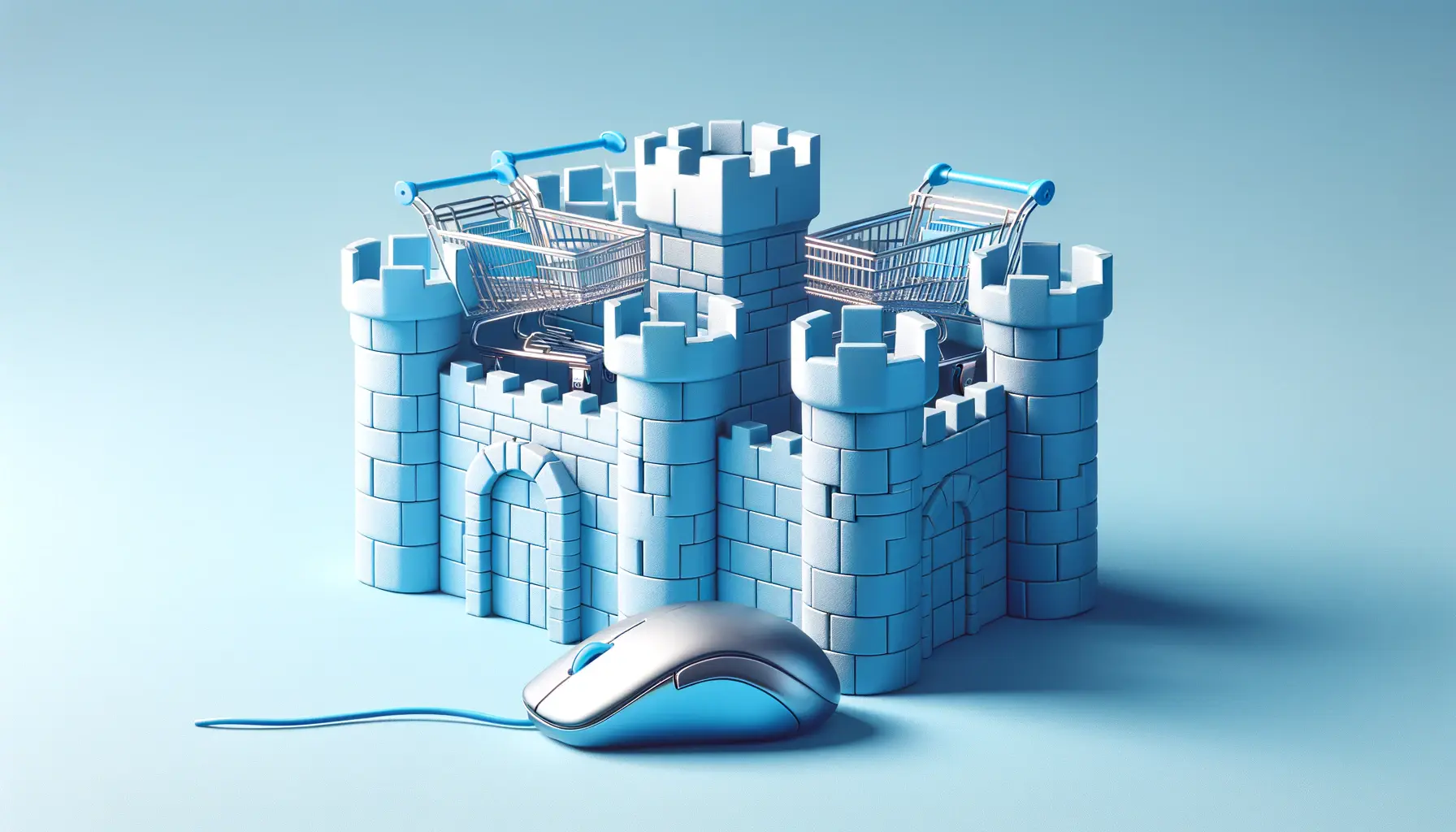Establishing authority in the online retail space is more than just a strategic advantage; it’s a necessity for survival and growth in an increasingly competitive market.
The concept of ‘authority’ in this context goes beyond mere recognition; it encompasses trust, credibility, and the perceived value that a site offers to its visitors.
In the digital age, where information is abundant and consumer attention spans are short, online retail sites must work diligently to build and maintain authority to stand out.
Authority building is not an overnight achievement.
It involves a series of deliberate, strategic actions aimed at enhancing the site’s reputation, increasing its visibility in search engine results, and fostering a loyal customer base.
This process is deeply intertwined with Search Engine Optimization (SEO) practices, as visibility on search engines like Google often translates to higher traffic and, subsequently, more opportunities to build authority.
The journey towards becoming an authoritative online retail site is multifaceted, involving content creation, user experience optimization, and engagement strategies that resonate with the target audience.
- Understanding the Pillars of Online Authority
- Strategies for Enhancing Online Visibility
- Engaging and Retaining Your Audience
- Leveraging Social Proof and Reviews
- Optimizing for Mobile and Speed
- Integrating Advanced Technologies
- Creating a Content Marketing Ecosystem
- Empowering Your Online Retail Site with Authority
- FAQs on Building Authority for Online Retail Sites
Understanding the Pillars of Online Authority
Content Quality and Relevance
The foundation of building authority online is high-quality, relevant content.
For online retail sites, this means providing more than just product descriptions.
It involves creating valuable content that addresses the needs, questions, and interests of the target audience.
This could take the form of how-to guides, product comparisons, and insightful articles related to the products or services offered.
Such content not only aids in SEO by targeting specific keywords but also establishes the site as a knowledgeable and reliable source in its niche.
Moreover, the freshness of content plays a crucial role.
Regular updates signal to search engines and users alike that the site is active and up-to-date with the latest trends and information.
This ongoing commitment to content quality and relevance is a key driver in building and sustaining authority over time.
User Experience and Site Trustworthiness
User experience (UX) is another critical pillar of online authority.
A site that is easy to navigate, fast-loading, and secure naturally earns the trust of its visitors.
Factors such as mobile responsiveness and secure checkout processes are not just value-added features but necessities in today’s digital shopping landscape.
Sites that prioritize UX are more likely to retain visitors, encourage repeat business, and garner positive reviews—all of which contribute to the site’s authority.
Trustworthiness extends beyond UX to include transparent communication about the business, clear return policies, and genuine customer service.
Demonstrating a commitment to customer satisfaction and security can significantly enhance a site’s reputation and authority.
Building online authority requires a combination of high-quality content, excellent user experience, and a commitment to trustworthiness.
Strategies for Enhancing Online Visibility
Increasing an online retail site’s visibility is a multifaceted endeavor that requires a strategic approach to SEO and content marketing.
Visibility is not just about appearing at the top of search engine results; it’s about being present where your audience spends their time.
This part of authority building focuses on leveraging various platforms and techniques to enhance your site’s online presence.
SEO Optimization
Search Engine Optimization (SEO) is the backbone of online visibility.
It involves optimizing your website and content to rank higher in search engine results for relevant keywords.
This includes:
- Keyword research to identify terms your target audience is searching for.
- On-page SEO, such as optimizing title tags, meta descriptions, and headers.
- Technical SEO, ensuring your site is crawlable and loads quickly.
By focusing on SEO, you can improve your site’s visibility, driving more organic traffic and building authority as a result.
Content Marketing and Distribution
Content marketing is about creating and sharing valuable content to attract and engage your target audience.
This strategy goes hand in hand with SEO but focuses more on the content’s value and distribution.
Effective content marketing strategies include:
- Creating engaging, informative blog posts that answer common questions or solve problems related to your niche.
- Utilizing social media platforms to share your content and engage with your audience.
- Email marketing campaigns to keep your audience informed and engaged with your brand.
Distributing your content across various channels increases your brand’s reach and authority, as it provides multiple touchpoints for engagement with your audience.
Link Building
Link building is a crucial aspect of SEO that involves getting other reputable sites to link back to your site.
This not only drives traffic but also enhances your site’s authority in the eyes of search engines.
Strategies for effective link building include:
- Guest blogging on relevant sites in your industry.
- Creating shareable content that naturally attracts links.
- Participating in industry forums and discussions, providing valuable insights and linking back to your content where appropriate.
Effective link building requires a focus on quality over quantity, as links from authoritative sites are more valuable than numerous links from lesser-known sources.
Enhancing online visibility through SEO, content marketing, and link building is essential for building authority.
Engaging and Retaining Your Audience
Engagement and retention are critical components of building authority for online retail sites.
Once you’ve attracted visitors to your site, the next step is to keep them engaged and encourage them to return.
This involves creating a positive user experience and providing value beyond just selling products.
Customer engagement strategies include:
- Interactive content, such as quizzes or polls, that encourages participation.
- User-generated content campaigns, inviting customers to share their experiences with your products.
- Personalization, using data to tailor the shopping experience to individual user preferences.
Retention strategies focus on keeping your audience coming back for more.
These can include:
- Loyalty programs that reward repeat customers.
- Email newsletters that provide exclusive content, offers, or insights.
- Outstanding customer service that addresses issues promptly and creates a positive impression.
Building a Community
Creating a sense of community around your brand can significantly enhance engagement and retention.
This can be achieved through:
- Active social media presence, engaging with followers and creating shareable content.
- Online forums or groups where customers can discuss your products and share tips.
- Events, either online or in-person, that bring your audience together and foster a sense of belonging.
Building a community not only helps in retaining customers but also turns them into brand advocates who can help spread the word about your site, further building its authority.
Providing Value Beyond Products
To truly engage and retain your audience, it’s important to offer value beyond just the products you sell.
This could include:
- Educational content related to your niche that helps customers make informed decisions.
- Free tools or resources that are useful for your target audience.
- Engaging storytelling that connects your brand to larger themes or values.
By focusing on providing value in various forms, you can enhance customer engagement, improve retention, and build a loyal community around your brand.
Engagement and retention are as crucial as attracting new visitors when it comes to building online authority.
Leveraging Social Proof and Reviews
In the digital age, social proof and customer reviews have become invaluable assets for online retail sites aiming to build authority.
These elements not only enhance credibility but also influence purchasing decisions, making them crucial for conversion optimization.
Social proof can take many forms, including:
- Customer testimonials that share positive experiences with your products or services.
- User-generated content, such as photos or videos of customers using your products, shared on your website or social media channels.
- Trust badges and certifications that signal your site’s credibility and security.
Implementing a robust system for collecting and showcasing customer reviews is essential.
Tips for effectively using reviews include:
- Encouraging customers to leave reviews by making the process simple and straightforward.
- Responding to reviews, both positive and negative, in a constructive manner that shows you value customer feedback.
- Featuring reviews prominently on your site, especially on product pages and during the checkout process.
Influencer Partnerships
Collaborating with influencers in your niche can amplify your social proof and extend your reach.
Influencer partnerships should be strategic, focusing on individuals whose audience aligns with your target market.
Effective influencer collaborations can include:
- Product reviews or unboxings shared on the influencer’s social media channels.
- Giveaways or contests that encourage engagement and spread awareness of your brand.
- Co-created content that leverages the influencer’s creativity and your brand’s unique selling points.
These partnerships can significantly boost your site’s authority by associating your brand with well-known and trusted figures in your industry.
Highlighting Case Studies and Success Stories
Case studies and success stories are powerful forms of social proof that detail how your products or services have positively impacted customers.
By showcasing real-life examples of customer satisfaction, you can:
- Demonstrate the effectiveness of your products in solving specific problems.
- Build trust with potential customers by providing tangible evidence of your brand’s value.
- Enhance your brand’s narrative by highlighting stories of success and transformation.
These elements not only serve to build authority but also connect with potential customers on an emotional level, making your brand more relatable and trustworthy.
Social proof and customer reviews are critical for building trust and authority in the online retail space.
Optimizing for Mobile and Speed
In today’s fast-paced digital world, optimizing your online retail site for mobile devices and ensuring quick load times are non-negotiable elements for building authority.
A site that is not mobile-friendly or suffers from slow loading times not only provides a poor user experience but also negatively impacts your SEO rankings, reducing your visibility and authority.
Mobile optimization involves:
- Designing your site with a responsive layout that adjusts seamlessly to different screen sizes.
- Ensuring that navigation is intuitive and touch-friendly for mobile users.
- Optimizing images and other media to load quickly without sacrificing quality.
Speed optimization, on the other hand, requires:
- Minimizing the size of CSS, JavaScript, and HTML files through compression.
- Implementing lazy loading for images and videos, so they only load when they come into the viewer’s screen.
- Choosing a reliable web hosting service that guarantees fast loading times.
User Experience (UX) Enhancements
Improving the overall user experience on your site goes hand in hand with mobile and speed optimization.
UX enhancements can include:
- Creating a clear and concise checkout process that minimizes steps and reduces cart abandonment.
- Offering multiple payment options to cater to different preferences.
- Providing easy access to customer support through live chat, FAQs, or a help center.
These improvements not only make your site more user-friendly but also contribute to building trust and authority by demonstrating your commitment to customer satisfaction.
Technical SEO Adjustments
Technical SEO is crucial for ensuring your site is discoverable and ranks well in search engine results.
Adjustments in this area can include:
- Improving site structure and navigation to ensure search engines can crawl your site efficiently.
- Using schema markup to help search engines understand the content on your pages better.
- Ensuring your site is secure by implementing HTTPS, which is now a ranking factor for Google.
These technical adjustments not only boost your SEO but also enhance the user’s sense of security and trust in your site, further establishing your online authority.
Mobile and speed optimization are critical for providing a positive user experience and enhancing your site’s authority.
Integrating Advanced Technologies
The integration of advanced technologies into online retail sites is not just a trend but a strategic move to build authority and enhance user engagement.
Technologies such as artificial intelligence (AI), augmented reality (AR), and personalized recommendation engines can significantly improve the shopping experience, making your site stand out as a leader in innovation.
Artificial Intelligence and Chatbots
- AI-powered chatbots can provide instant customer service, answering queries and guiding users through their shopping experience.
- Personalized shopping assistants powered by AI can offer product recommendations based on user behavior and preferences, enhancing the personalization of the shopping experience.
Augmented Reality (AR) Experiences
- AR technology allows customers to visualize products in their own environment before making a purchase, reducing uncertainty and improving satisfaction.
- Implementing AR can differentiate your brand, showcasing your commitment to providing innovative and customer-centric shopping experiences.
Personalized Recommendation Engines
- By analyzing user data, personalized recommendation engines can suggest products that are more likely to be of interest to the customer, increasing the chances of purchase.
- These engines enhance the shopping experience by making it feel tailored to each individual, building loyalty and trust.
Enhancing Security Measures
As technology advances, so do the expectations for security and privacy.
Enhancing security measures is crucial for maintaining customer trust and authority.
This includes:
- Implementing advanced encryption methods to protect user data.
- Regularly updating your site’s security protocols to guard against new threats.
- Transparently communicating your privacy policies and how customer data is used and protected.
Investing in the latest security technologies not only protects your customers but also reinforces your site’s reputation as a trustworthy and authoritative online retail destination.
Continuous Innovation
Authority in the online retail space is not just about what you offer today but how you continue to evolve and innovate.
Keeping abreast of technological advancements and integrating them into your site demonstrates a commitment to excellence and customer satisfaction.
Continuous innovation is key to maintaining and growing your authority in a competitive market.
Ignoring the potential of advanced technologies can hinder your site’s ability to build and maintain authority.
Creating a Content Marketing Ecosystem
Building authority for online retail sites extends beyond the products and into the realm of content.
A robust content marketing ecosystem supports SEO efforts, engages and educates your audience, and establishes your site as a thought leader in your industry.
This comprehensive approach to content creation and distribution is vital for sustained authority.
Developing a Content Strategy
- Identify the needs and interests of your target audience to create relevant and valuable content.
- Utilize a variety of formats, such as blog posts, videos, infographics, and podcasts, to cater to different preferences and enhance engagement.
- Plan a content calendar that aligns with industry events, seasonal trends, and product launches to keep your content timely and relevant.
SEO-Driven Content Creation
- Incorporate targeted keywords naturally into your content to improve search engine rankings and visibility.
- Create in-depth, quality content that addresses specific questions or problems your audience may have, positioning your site as a helpful resource.
- Update existing content regularly to keep it fresh and maintain its SEO value over time.
Content Distribution and Promotion
- Leverage social media platforms to share your content and reach a wider audience.
- Engage in email marketing to deliver personalized content directly to your audience’s inbox.
- Consider partnerships with other brands or influencers to co-create content and tap into new audiences.
Measuring Content Performance
Understanding the impact of your content is crucial for refining your strategy and ensuring it contributes to building authority.
Key metrics to monitor include:
- Website traffic and user engagement with your content.
- Conversion rates, indicating how effectively your content drives sales or other desired actions.
- Social shares and mentions, reflecting the reach and influence of your content.
By regularly analyzing these metrics, you can identify what resonates with your audience and adjust your content strategy accordingly.
Continuous Improvement
The digital landscape is ever-evolving, and so should your content marketing ecosystem.
Stay informed about the latest trends in content creation and distribution, and be willing to experiment with new ideas and technologies.
Continuous improvement in your content strategy is essential for maintaining and enhancing your site’s authority in the competitive online retail space.
A dynamic content marketing ecosystem is crucial for establishing and sustaining authority, driving engagement, and supporting SEO efforts.
Empowering Your Online Retail Site with Authority
Building authority for your online retail site is a multifaceted journey that demands attention to detail, a strategic approach, and a commitment to excellence.
In the digital marketplace, where competition is fierce and customer expectations are high, establishing your site as an authoritative source is essential.
This not only enhances your brand’s credibility but also fosters trust and loyalty among your audience, leading to sustained growth and success.
The Cornerstones of Authority
As we’ve explored, the foundation of building authority in the online retail space rests on several key pillars.
High-quality, relevant content tailored to your audience’s needs sets the stage for engagement and positions your site as a valuable resource.
SEO optimization ensures that your content reaches its intended audience, enhancing visibility and driving organic traffic.
Meanwhile, engaging and retaining your audience through personalized experiences and community building transforms casual visitors into loyal customers and brand advocates.
Leveraging Technology and Innovation
Incorporating advanced technologies such as AI, AR, and personalized recommendation engines not only elevates the user experience but also signals your commitment to staying at the forefront of digital retail innovation.
These tools can significantly enhance the shopping experience, making your site more engaging and accessible to a tech-savvy audience.
Moreover, optimizing your site for mobile and speed is non-negotiable in today’s fast-paced world, where users expect seamless and efficient interactions.
Creating a Dynamic Content Marketing Ecosystem
A robust content marketing ecosystem is vital for sustaining authority.
By developing a comprehensive content strategy that includes diverse formats and distribution channels, you can engage your audience at multiple touchpoints.
Measuring content performance and continuously refining your approach based on data-driven insights ensures that your content marketing efforts contribute effectively to building authority.
Remember, authority is not just about what you say; it’s about how you say it and ensuring it resonates with your audience.
In conclusion, building authority for your online retail site is an ongoing process that requires dedication, innovation, and a deep understanding of your audience’s needs and preferences.
By focusing on quality content, user experience, technological advancements, and a strategic content marketing approach, you can establish your site as a trusted leader in the online retail space.
Embrace these strategies with a commitment to continuous improvement, and watch as your site’s authority grows, paving the way for long-term success and customer loyalty.
Want your website to top Google search rankings? Leave the SEO to our professional agency!
FAQs on Building Authority for Online Retail Sites
Explore common questions about enhancing your online retail site’s authority, with insights tailored to help you navigate this crucial aspect of digital marketing.
An authority site is recognized as a leading source for information and products in its niche, trusted by users and search engines alike.
Authority enhances trust, improves SEO rankings, and increases conversion rates by establishing your site as a credible and reliable source.
Quality content addresses your audience’s needs, positions you as an expert, and improves visibility and engagement on search engines.
SEO increases your site’s visibility, making it easier for potential customers to find you and recognize your site as an authority.
Yes, active social media engagement can boost your brand’s visibility, foster community, and enhance your site’s perceived authority.
Reviews provide social proof, enhancing trust and credibility among potential customers, which is essential for building authority.
Advanced technologies like AI, AR, and personalized recommendation engines improve user experience and signal innovation and leadership.
Regular updates keep your content relevant and fresh, signaling to both users and search engines that your site is a current authority.













